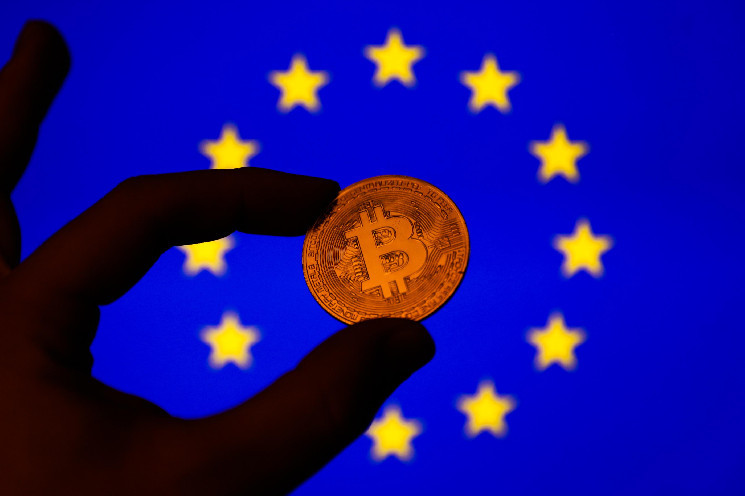Policy & Regulation
New EU Rules Could Threaten Your Security – What You Need To Know

Credit : cryptonews.net
The Monetary Motion Process Power Journey Rule, designed to fight cash laundering and terrorist financing, is on the heart of a debate about balancing regulatory oversight and privateness. Monetary establishments, together with Digital Asset Service Suppliers, should acquire and share Know Your Buyer info with different establishments concerned within the transaction.
Initially launched for conventional finance in 2012, the rule has now been prolonged to bitcoin transactions. Critics argue that making use of this rule to bitcoin undermines the rules of privateness and monetary freedom, whereas additionally introducing new dangers and unintended penalties.
Primarily based in Paris, France, the FATF is a non-elected worldwide group created in 1989 by the G7 international locations. Over the many years, its mandate has expanded with a 2019 initiative aimed toward addressing perceived “threats” to the integrity of the monetary system. This growth positioned bitcoin and different digital belongings below the purview of the FATF, viewing them as potential threats to the established monetary order. International locations that refuse to adjust to FATF suggestions threat exclusion from the worldwide monetary community.
Not like different digital belongings which are usually grouped below the umbrella of ‘crypto’, Bitcoin is distinguished by its decentralized and immutable ledger. As the primary and most generally accepted digital foreign money, Bitcoin was designed to function outdoors the management of centralized authorities. Its pseudonymous nature ensures that transactions are seen on the blockchain, however with out revealing delicate private knowledge. This transparency already offers a level of accountability whereas preserving particular person privateness, making the FATF’s measures appear redundant and misaligned.
Bitcoin isn’t just a ‘crypto asset’. It’s a protocol with a transparent goal to function a decentralized and censorship-resistant financial community. The applying of the FATF Journey Rule to bitcoin undermines its core rules, significantly its emphasis on person privateness and monetary freedom. This regulatory push threatens to show Bitcoin into yet one more software of surveillance, eroding the freedoms it was designed to guard.
Privateness and safety
Bitcoin customers already face challenges in defending their monetary privateness. The Journey Rule requires verifying pockets possession and gathering private info. This goes towards Bitcoin’s core thought of permitting people to regulate their funds with out intermediaries. Requiring compliance might push customers towards centralized directors, exposing them to dangers equivalent to hacking, knowledge breaches, and authoritarian surveillance.
The erosion of privateness stays probably the most controversial matter. It is very important notice that the Journey Rule requires VASPs to ahead KYC knowledge to different VASPs with which their prospects transact, just like the standard utility of the rule to monetary establishments. Excessive-profile knowledge breaches have gotten more and more frequent.
Aggregating private and transaction knowledge from a number of directors will increase the danger of misuse, both by means of hacking or unauthorized surveillance. For people, this course of includes transferring private info to an ever-growing listing of third events, growing publicity to identification theft and lack of autonomy.
Critics argue that these measures are extreme, particularly given the pseudonymous nature of bitcoin transactions. Not like america, the place exemptions exist for smaller transactions, the European Union’s stricter implementation successfully mandates reporting for nearly all transactions. This requirement traps reliable customers and creates obstacles to entry for these searching for monetary independence by means of bitcoin.
Regulatory burden The UK formalized the Journey Rule on September 1, 2023 by means of amendments to the Cash Laundering, Terrorist Financing and Transfers of Funds Regulation 2017. In the meantime, the European Union has included the Journey Rule into the Switch of Funds Regulation, requiring compliance by crypto belongings. service suppliers no later than December 30, 2024 as a part of the Markets in Crypto-Belongings Regulation, also referred to as MiCA. The Funds Switch Regulation and MiCA had been each formally printed within the Official Journal of the EU on 9 June 2023, and can each apply from 30 December 2024.
Britain’s method adapts the Journey Rule to the prevailing anti-money laundering framework. The EU is incorporating the Journey Rule into its MiCA framework and creating particular guidelines for digital belongings.
The Journey Rule has additionally launched compliance burdens that disproportionately have an effect on smaller establishments and companies. Though some international locations have launched thresholds for gathering further info, the rule requires compliance for all transfers of digital belongings by way of knowledge forwarding, whatever the transaction quantity. These measures are supposed to extend transparency, but additionally enhance operational prices for startups and smaller entities, favoring established gamers who can take up the prices and leaving little room for brand new entrants.
The implementation undermines monetary inclusion, a key promise of Bitcoin. By introducing obstacles equivalent to identification verification and proof of tackle possession, the rule alienates these dwelling below authoritarian governments and the underbanked populations who stand to profit most from decentralized monetary programs.
Classes from conventional finance
The Journey Rule was first applied within the conventional monetary world greater than a decade in the past and was supposed to fight cash laundering. Nevertheless, the observe document stays spectacular. Research persistently estimate that world cash laundering within the conventional monetary sector is answerable for 2 to five% of GDP, a variety that has remained unchanged since 1998. This stagnation raises questions concerning the effectiveness of the rule in tackling illicit monetary actions.
Freedom of Info Act requests in Germany revealed no substantial proof linking compliance with the Journey Rule to a discount in cash laundering, as documented by FragDenStaat. Though the FOIA was designed to evaluate the effectiveness of AML applications normally, evaluating knowledge earlier than and after the appliance of the Journey Rule, the response confirmed that German regulation enforcement lacks knowledge on the effectiveness of AML applications in normally. This lack of centralized knowledge casts doubt on the rule’s success.
Centralizing KYC knowledge creates a single level of chapter, making it a goal for cyber assaults. Excessive-profile breaches, equivalent to Equifax in 2017 and India’s Aadhaar system, uncovered delicate info belonging to hundreds of thousands of individuals, resulting in identification theft and monetary fraud. In high-risk jurisdictions, centralized databases pose further dangers as authoritarian regimes or legal teams can misuse leaked knowledge to focus on people. Sharing KYC info might expose donors to NGOs in high-risk areas equivalent to Venezuela to related dangers, probably compromising relatively than growing person security.
FATF-inspired rules have led to adjustments in the best way unhosted wallets are dealt with. The UK initially proposed gathering complete knowledge on all transactions involving unhosted wallets, however later softened its place attributable to business opposition. HM Treasury acknowledged that requiring info for all unhosted portfolio transactions would impose disproportionate burdens with out clear advantages. This instance reveals how FATF suggestions can result in overly intrusive measures, probably damaging privacy-oriented improvements, even in well-regulated markets.
Pakistan is an instance of how FATF strain can result in outright bans. Pakistan’s finance minister not too long ago said that cryptocurrency would “by no means be authorized” attributable to FATF necessities. This crackdown suppresses enterprise and pushes reliable monetary actions underground, undermining the FATF’s said targets of transparency and combating illicit finance.
Decentralized options, equivalent to blockchain-based KYC programs, scale back single factors of failure and enhance privateness. With out these measures, centralized storage will proceed to place people in danger, particularly in weak areas.
A balanced method
The scope and implementation of the Journey Rule stay a topic of debate. Exemptions for smaller transactions, just like these in america, might scale back compliance burdens whereas preserving the rule’s aims. Know-how options equivalent to zero-knowledge proofs can present methods to adjust to rules whereas defending person privateness.
Transparency and accountability are vital for the effectiveness of the rule. Its widespread adoption would profit from clear proof of its influence, with unbiased research and publicly obtainable knowledge serving to to tell future coverage selections.
In its present kind, the FATF Journey Rule is a cautionary story of how well-intentioned insurance policies can go unsuitable. As the controversy continues, stakeholders should work collectively to make sure the way forward for the monetary sector stays open, inclusive and supportive of enterprise.
-

 Meme Coin7 months ago
Meme Coin7 months agoDOGE Sees Massive User Growth: Active Addresses Up 400%
-

 Blockchain1 year ago
Blockchain1 year agoOrbler Partners with Meta Lion to Accelerate Web3 Growth
-

 Videos1 year ago
Videos1 year agoShocking Truth About TRON! TRX Crypto Review & Price Predictions!
-

 Meme Coin1 year ago
Meme Coin1 year agoCrypto Whale Buys the Dip: Accumulates PEPE and ETH
-

 NFT9 months ago
NFT9 months agoSEND Arcade launches NFT entry pass for Squad Game Season 2, inspired by Squid Game
-

 Solana4 months ago
Solana4 months agoSolana Price to Target $200 Amid Bullish Momentum and Staking ETF News?
-

 Ethereum1 year ago
Ethereum1 year ago5 signs that the crypto bull run is coming this September
-

 Gaming1 year ago
Gaming1 year agoGameFi Trends in 2024



































